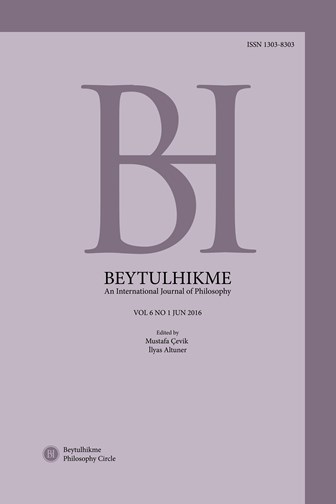Author :
Abstract
Bu yazı Platon’da kişinin kendisini gerçekleştirmesi olarak şehirde adaletin (politike dikaiosyne) nedirini Platon’un onu Politeia adlı yapıtında dialektike denilen methodos ile açık kıldığı tarzda etraflıca ele alıyor. Platon’un Politeia adlı yapıtında açıkladığı tarzda, bir polis’in ancak nasıl adil olabileceği, adil bir polis’te bu adil polis’in varolması için zorunlu diye düşünülen bir eğitim sisteminin nasıl olması gerektiği, şehirde adalet ile kişide adalet arasındaki ayırım, kadının bu polis ve politeia içerisindeki yeri de ayrıntılı açıklanıyor. Metinde “herkesin kendininkini yapması” (to tou autou prattein) olarak şehirde adalet ile symphonia ya da harmonia olarak kişide adaletin nediri ve birbiri ile ilişkisi de açık kılınıyor. Bununla birlikte polis, politeia, pleoneksia, tekhne, episteme, psykhe gibi temel Platon kavramlarının nediri tartışılıyor, Platon’a göre her tek kişinin mutlu olmasının ne demeye geldiğinin ve ancak nasıl olanaklı olabileceğinin hesabı veriliyor ve bunun politike dikaiosyne (şehirde adalet) ile ilişkisi açıklanıyor. Metinde Politeia adlı yapıtta sınanan, adalete ilişkin temel endokson’lar (genel kanılar) sözgelimi adaletin “kişiye borçlu olunanı vermek” olduğu yollu sav ya da adaletin “güçlünün işine gelen” olduğu yollu sav ile Platon’un bu savlarda yakaladığını düşündüğü açmazlar da seriliyor. Bu savlar Platon tarafından gelişigüzel seçilmiş değildir, aksine pekçoklarının, “sürü”nün onlarla iş gördüğü bu çok belli endokson’ların sınanması bir politeia’nın tarzını onu daha adil kılacak biçimde değiştirebilir. Bununla birlikte Platon bu savlarda olduğunu düşündüğü açmazlara didişmeci bir tarzda diyesim sofistçe değil eidos’lara göre ayrıştırmaya giderek işaret eder. Bu tarzda ele alındıkta Platon’un Politeia adlı yapıtında önerdiği yönetim biçimi (aristokrasi = en iyilerin yönetimi), içerisinde “yabancılaşma”nın, kölenin ya da kölece emeğin görülmediği bir yönetim biçimi olarak ortaya çıkmaktadır.
Keywords
Abstract
This paper discusses in detail the whatness of justice in the city as self-realization as Plato explains it in his dialogue named Politeia using the methodos called dialektike. The paper gives a detailed explanation of how a polis can be just, how the education system, which is conceived as necessary for a city to be just, should be in a city that is just, the distinction between justice in the city and justice in one person, the role of women in this polis and politeia, as Plato explains these in his work named Politeia. The text also discusses the whatness of justice in the city as each person doing his/her own (to tou autou prattein), and justice of one person as symphonia or harmonia, and the relationship these two have with one another. Furthermore the whatness of basic Platonic concepts such as polis, politeia, pleoneksia, tekhne, episteme, psykhe is discussed, and an explanation regarding what it means for a person to be happy according to Plato, and how it is possible; and what relation this has with politike dikaiosyne (justice in a city) is provided. The text tracks in the dialogue basic endoksa (general opinions) such as justice as “giving what one owes to another” or justice as “the advantage of the stronger”, and the problems Plato points out in these doksai. These arguments are not arbitrarily chosen and inserted in his text by Plato, on the contrary trying the endoksa of the multitude or the “herd” might alter the functioning of the politeia in a way that it becomes more just. In addition to this Plato emphasizes the perplexities that he thinks these arguments involve, in such a way which by no means can be described as eristic namely one that involves sophistry, but in such a way that involves making distinctions according to eide. Having analyzed in this way one can argue as a conclusion that the sort of rule Plato suggests (namely “aristocracy”: the rule of the best) turns out to be a rule in which there is no “alienation”, slavery or “slave labor”.
Keywords
- Aristoteles (2007). Nikomakhos’a Etik (çev. S. Babür). Ankara: BilgeSu Yayıncılık.
- Aristotle (2002). Nicomachean Ethics (trans. J. Sachs). Newburyport, MA: Focus Publishing.
- Heidegger, M. (1995). Aristotle’s Metaphysics Theta 1-3: On the Essence and Actuality of Force (trans. W. Brogan & P. Warneck). Bloomington: Indiana University Press.
- Heidegger, M. (2010) Aristoteles Metafizik Theta 1-3: Gücün Neligi ve Gerçekligi (çev. S. Babür). Ankara: BilgeSu Yayıncılık.
- Heidegger, M. (1997) Vom Wesen der Wahrheit. Frankfurt: Vittorio Klosterman.
- Kuçuradi, I. (2005). İnsan Hakları: Kavramlar ve Çeşitleri. Ankara Barosu.
- 14 Bkz. (Aristoteles, 2005, 1169a) “Nitekim her bir kişiyi o kişi yapan şey nous’tur ya da en çok odur.”
- Marx, K. (2005). Ökonomisch-Philosophische Manuskrpite. Meiner Philosophische Bibliothek, Band 559. Hamburg: Felix Meiner Verlag.
- Marx, K. (1988). Economic and Philosophic Manuscripts of 1844 (trans. M. Milligan). New York: Prometheus Books.
- Plato (1992). Republic (trans. G. M. A. Grube). Indianapolis: Hackett Publishing Co.
- Plato (2007). Republic (trans. J. Sachs). Newburyport, MA: Focus Philosophical Library.
- Platon (1995). Platonis Opera. Oxfodd: Oxford University Press.





